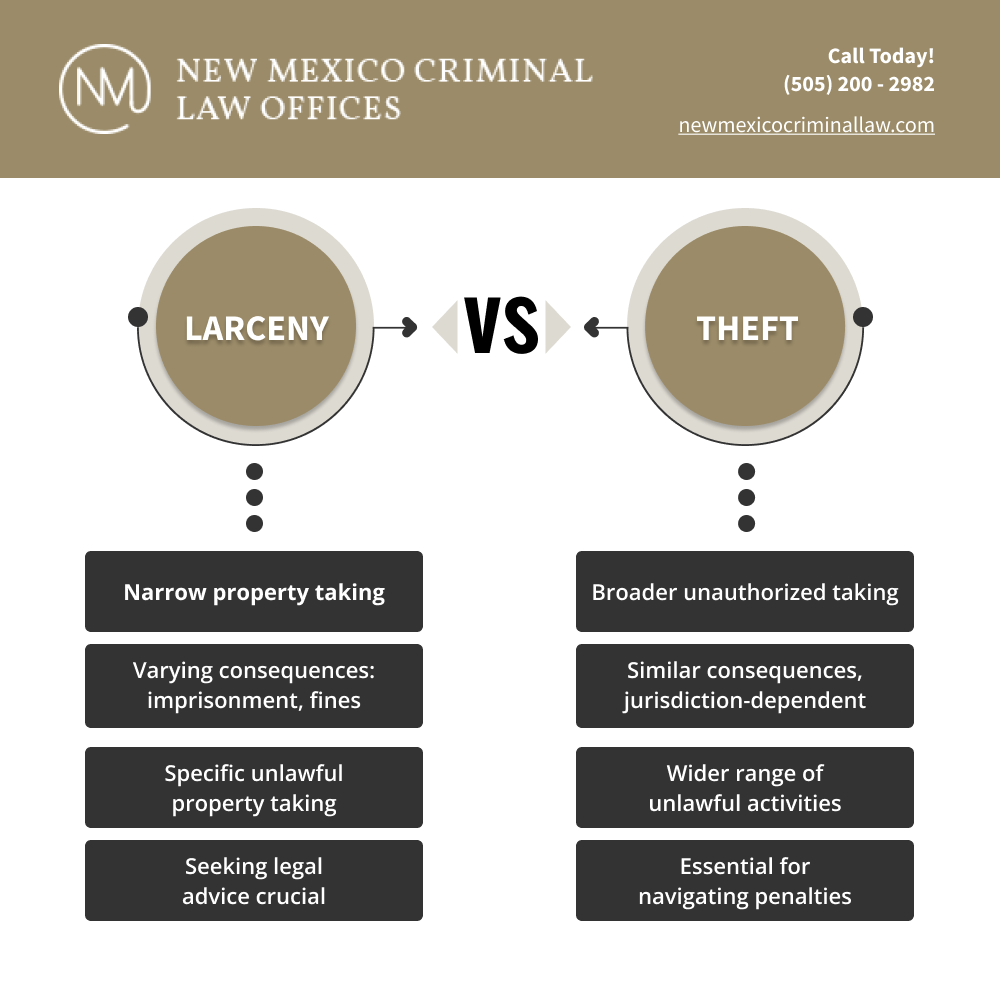
When not considering the state, theft and larceny can be very different allegations. However, they both involve the taking of property from its rightful owner with the intent to deprive them of that property and any benefits that come with its ownership.
A General Overview of Theft
Theft may be considered larceny, depending on where you live. It may also go by various names, depending on the state and how they have set up their criminal statutes. For example, there may be a category of petty theft and grand theft, or theft itself may be a category under larceny.
In general, theft is one of the more common crimes committed in the United States. It involves taking a person’s property without the owner’s permission to deprive them of that property. A common example, and crime committed, under theft is shoplifting.
Theft can involve various types of property – and it doesn’t have to occur at a retail store either.
To qualify as a “theft” crime, three elements must be present.
- You stole property that did not belong to you and was rightfully owned by another party. You have taken tangible property from another person or party. That said, the property must be an item of money, a physical good, or some sort of object that you can remove from a person and take into your possession. Stealing someone’s land is not theft, but it is a different crime and would result in different criminal charges.
- You were stealing that property against the owner’s knowledge. You do not have the owner’s permission to remove the property from their possession. If you were to take something with the owner’s permission, then you have not committed theft. However, if you were to get their permission through acts of trickery, then you could still be charged with a theft crime. For example, if you ask to borrow a neighbor’s lawn mower, they lend it to you. Instead of returning it as you led them to believe, you sell that lawn mower for money. You have committed theft, because you tricked the owner into giving you permission to take the property, but you were not given permission to take ownership or sell that property.
- You had the intention of depriving the owner of his or her property. The last element is the intent to deprive. You must have intended for the owner to be permanently deprived of their property at the time you took it, otherwise, there is no theft act.
A General Overview of Larceny
Most states will say that larceny is defined by that fact that you took property that is owned by someone else, you did not have permission, and you did so with intent to deprive the owner of that property. Therefore, it is a lot like theft. The only difference, however, is that larceny crimes are often felonies, while theft crimes are charged as misdemeanors.
Larceny vs Theft

Larceny vs theft: Though often used interchangeably, larceny implies narrower property taking, while theft encompasses broader offenses. Legal consequences vary, but both may result in imprisonment and fines. Seeking legal counsel is crucial to navigate these nuanced distinctions and potential repercussions effectively.
How Does New Mexico Define Larceny and Theft?
In the state of New Mexico, larceny is the act of theft where you take something of value that does not belong to another party. Therefore, larceny is a generalized theft crime. You can also be charged with larceny for receiving stolen property. New Mexico uses larceny as a way to create a broad category of theft crimes that include:
- Outright stealing property from another person
- Falsely taking services
- Shoplifting
- Identity theft
- Stealing a credit card or using a credit card number of another person
- Receiving stolen property
The state classifies larceny crimes based on the value of the property stolen.
For example, property with a value of under $500 is a misdemeanor larceny offense. Once the property is over $500, you are now entering felony territory. All larceny crimes include a jail or prison sentence, and the length depends on the value of the property stolen and the crime you are charged with.
For example, petty larceny, which is the least serious theft crime in the state, involves stealing property with a value under $250. This is a common charge for shoplifters. It is a petty misdemeanor, but you can still spend up to six months in a county jail for that crime. First-time offenders are less likely to serve a maximum sentence, but you still may see a few days in jail.
When the property exceeds $500, you could face a fourth-degree felony. With that conviction comes up to 18 months imprisonment. There are numerous items you could steal that still qualify for a felony charge, because the fourth-degree felony threshold is only up to $2,500. Therefore, you may steal a television, computer, or even someone’s smartphone and possibly face a felony conviction.
The highest felony for theft in New Mexico is second-degree larceny. In this case, the property was $20,000 or more. The only time a person would face this charge is stealing high-value property, including vehicles or jewelry. If convicted, however, you can face up to 9 years imprisonment.
Theft Crimes Include Civil Penalties
In the state, you are not only risking criminal penalties, but civil as well. You may be sued in civil court for depriving the owner of their property, and you may have to pay a judgment that includes the replacement cost of the property stolen and any legal costs of the owner.
Facing Theft or Larceny Charges? Contact an Attorney Today
A larceny allegation is serious. Not only will that create a permanent criminal record that could prevent you from obtaining employment, but if you are convicted, you will have a jail sentence, fines, and civil penalties.
Do not let a larceny crime ruin the rest of your life. Instead, contact a criminal defense attorney immediately. The team at New Mexico Criminal Law Offices can assist you with your case. Contact us today by calling the office to schedule your confidential case evaluation or fill out an online contact form and someone will be in touch with you soon.

